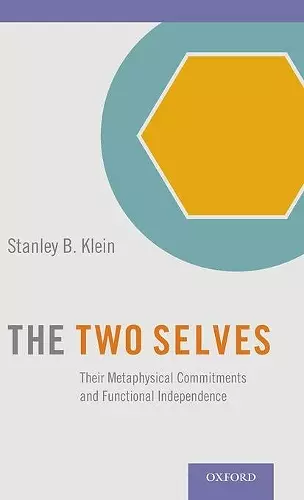The Two Selves
Their Metaphysical Commitments and Functional Independence
Format:Hardback
Publisher:Oxford University Press Inc
Published:5th Dec '13
Currently unavailable, and unfortunately no date known when it will be back

The Two Selves takes the position that the self is not a "thing" easily reduced to an object of scientific analysis. Rather, the self consists in a multiplicity of aspects, some of which have a neuro-cognitive basis (and thus are amenable to scientific inquiry) while other aspects are best construed as first-person subjectivity, lacking material instantiation. As a consequence of its potential immateriality, the subjective aspect of self cannot be taken as an object and therefore is not easily amenable to treatment by current scientific methods. Klein argues that to fully appreciate the self, its two aspects must be acknowledged, since it is only in virtue of their interaction that the self of everyday experience becomes a phenomenological reality. However, given their different metaphysical commitments (i.e., material and immaterial aspects of reality), a number of issues must be addressed. These include, but are not limited to, the possibility of interaction between metaphysically distinct aspects of reality, questions of causal closure under the physical, the principle of energy conservation, and more. After addressing these concerns, Klein presents evidence based on self-reports from case studies of individuals who suffer from a chronic or temporary loss of their sense of personal ownership of their mental states. Drawing on this evidence, he argues that personal ownership may be the factor that closes the metaphysical gap between the material and immaterial selves, linking these two disparate aspects of reality, thereby enabling us to experience a unified sense of self despite its underlying multiplicity.
Klein's argument is convincing, and any disagreement with the details of his view should be dwarfed by the admiration for the originality of his approach. While Klein's home discipline is psychology, this is as much a book of philosophy as it is of psychology. Such truly interdisciplinary work is, unfortunately, extremely rare. * Kourken Michaelian, Minds & Machines *
Klein not only succeeds in producing a cogent argument for distinguishing between these two senses of "self," he produces a clear characterization of them. These successes alone would have made this book well worth reading, but Klein does more. He shows that one fruitful avenue for enhancing our understanding of self is to attend to abnormalities of belonging, those instances wherein the relationship between self and its experiences is disrupted. I believe the search for a "mental glue" that binds the self to its experiences will help to focus, invigorate, and integrate research spanning multiple fields, as well as lead to a comprehensive framework for understanding self, that elusive datum about which all else revolves. * Timothy Lane, Taipei Medical University *
This is a wholly original book that derives from the distinctive, creative and (in my view) downright brilliant insights of the author. The book powerfully points out that the epistemological self is, if anything, over-studied, while the ontological self (of experience) is sadly neglected empirically and conceptually. The scholarship is impressively wide and deep, demonstrating a thorough and sophisticated knowledge of contemporary research on the self and social cognition as well as current philosophy of mind and of science-two knowledge stores that are rarely to be found within the same brain, let alone the same book. * David Funder, Professor of Psychology, University of California *
Klein is a profound thinker and a well-known leading force in a multidisciplinary field that deals with the ever-mysterious and fascinating issues of the human mind. One of the most prominent of these is the concept of 'self.' Klein has been at the forefront of the field of study of 'self' from the beginning. His new book takes a quantum leap forward in the field. The thesis of the book is that much of the extant uncertainty and confusion about 'self' could be cleared up by the postulation of two independent but closely interacting forms of self, which he calls epistemological and ontological. This is a fascinating idea. It is easy to imagine that it will become the focus of a great deal of philosophical and cognitive-science work on 'self' in the future. * Endel Tulving, University Professor Emeritus, University of Toronto *
My first impression when I started The Two Selves was that S.B. Klein had asked the right question. My conviction when I finished the book was that Klein had indeed come to grips with the central problem of the self. His work is a welcome effort to distinguish between the threads, with which is woven the seamless tapestry we call self. Klein has shown, not for the first time, that he is at the centre of the meaningful and intriguing project of psychologists and philosophers working together to try and understand the self. Klein's book is an essential reading for any person interested in the self and more generally, in the human mind. * L. Manning. Professor at the University of Strasbourg *
ISBN: 9780199349968
Dimensions: 147mm x 211mm x 25mm
Weight: 315g
176 pages